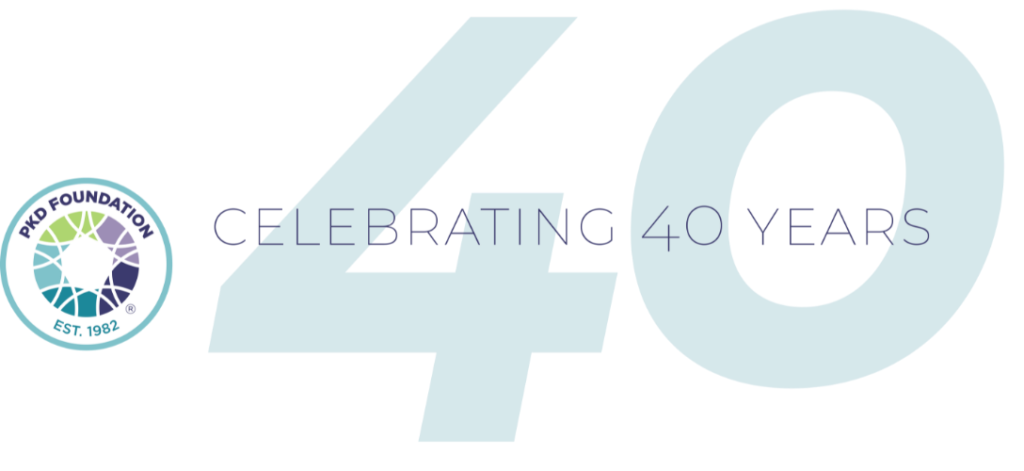
Published on August 23, 2022 | This weekend, we celebrated 40 years of the PKD Foundation. Over those past four decades, the field of polycystic kidney disease has seen immense growth. From improving the understanding of PKD, to creating legislative protections, to establishing local communities of support. The PKD Foundation has been there every step of the way for those affected by PKD.
The First 40 Years of the PKD Foundation
On August 20, 1982, the PKD Foundation was founded by Jared J. Grantham, M.D., and Joseph H. Bruening. What was their vision? To find treatments and a cure for polycystic kidney disease (PKD). While discovering treatments and a cure was the vision for the PKDF, giving hope became our mission. The PKD community needed us to do more than fund PKD research. Community, education, and advocacy became other vital pillars to the PKD Foundation.
Community
While we can all agree treatments and a cure are essential goals for those impacted by PKD, finding a supportive community is also important. In 1987, the first local PKD community was formed in Chicago. Now, there are communities from coast to coast to bring support, empathy, and engagement to all impacted by PKD. Find the one nearest to you! These local communities host meetings to bring members together and even connect them with speakers like local nephrologists. In ensuring that no one walks alone with PKD, these communities are essential.
However, local communities aren’t the only way the PKDF brings together PKD patients and families around the country. Since 2000, the Walk for PKD has united patients, families, researchers, and clinicians to end PKD. It’s the nation’s largest PKD awareness event and the PKDF’s signature fundraiser. That first Walk for PKD raised $214,000. Since then, the Walk for PKD had raised $34 million for research. And 2022 Walk for PKD events are nearly here. You can find your local Walk (or our virtual one) at walkforpkd.org.
Education
In order to create better patient outcomes, access to education and resources are necessary. In 1989, we wanted provide PKD education while facilitating connections within the PKD community. So, what did that look like? The inaugural PKD National Convention (PKDCON). With education sessions hosted by PKD experts, patients, families, and caregivers can learn directly from researchers and clinicians. Over the years, PKDCON has been hosted in cities all over the country as well as in a virtual environment during the COVID-19 pandemic. Session recordings from this year’s conference will be up on the website soon for anyone who couldn’t make it.
Beyond expert-led PKDCON sessions, the PKD community has an important say in the education they want to receive. Last year, the PKD Foundation announced the formation of the Education Advisory Panel (EAP). This panel helps guide the development of the PKDF’s education at patient and health care provider levels. This education comes in a variety of forms: webinars, PKD Life articles, informational blogs. Through education, we hope to empower patients to take an active role in advocating with the health care teams.
For those at the beginning of the PKD journey, our resource library is a great place to start for information on ADPKD and ARPKD.
Advocacy
In addition to building a community and creating education, ensuring federal protections and resources are available for those impacted by PKD further our mission of giving hope. Since 1990, the PKDF has lobbied Congress—firstly to include the first Appropriations Committee report language about PKD research support by the National Institutes of Health (NIH), encouraging the NIH to expand research in the pathogenesis and treatment of PKD. A mere three years later, the NIH made a major federal investment of $5.73 million in PKD research.
Federal investment in PKD continued throughout the early 2000s. In 2006, the U.S. Senate passed first-ever National PKD Awareness Week Resolution to help promote the Walk for PKD. The first PKD Foundation United on the Hill event took place in 2008, pushing for more federal funding for PKD research and to pass the Genetic Information Nondiscrimination Act (GINA). After a 13-year fight, GINA passed Congress and was signed into law. Most recently, the Comprehensive Immunosuppressive Drug Coverage for Kidney Transplant Patients Act of 2019 was passed.
What does advocacy look like today? Through the Advocacy Champions Network (ACN), PKD community members from across the U.S. engage in formal advocacy efforts with federal policymakers. Members of the ACN are hand-picked to share their personal stories and advance the legislative priorities of the PKD community. This past April, the PKD Foundation hosted a Virtual Advocacy Day open to all members of the PKD community. Together, they met with federal lawmakers around the country to advocate for the PKD community’s needs. More eyes on PKD means more funding for life-saving research, and one day, a cure.
The Next 40 Years of the PKD Foundation

“More than ever, we’re committed to giving hope and serving every corner of the PKD community. By expanding our research and education programming, we’ll drive more effective disease management and treatment approaches from concept to clinical practice, improving outcomes for PKD families. Our dedication to supporting research through our grants program and federal funding secured through our advocacy efforts will continue growing. We won’t stop until we realize our vision of ending PKD.”
—Chris Rusconi, Ph.D.
Interim CEO and Chief Research Officer
Driving the Treatment Pipeline
Helping us reach that vision of a PKD-free world is the Polycystic Kidney Disease Outcomes Consortium (PKDOC). A collaboration with the FDA and researchers, it works to establish drug development tools that will bring PKD treatments to market faster. Today, there are over a dozen drugs in the pipeline. In these next 40 years, the PKD Foundation plans to continue its leadership role in PKDOC and maintaining its commitment to bringing more treatments and a cure to the PKD community.
Improving the ADPKD Registry and Furthering Research
In just three years, the ADPKD Registry, the first national patient registry for individuals with ADPKD, has grown to include over 2,500 participants. The Registry collects information in a standardized and anonymous format, telling us about the patient journey, unmet medical needs, and patient preferences while revealing more about the disease burden on the lives of ADPKD patients and their families. As part of the PKDF’s plans for the future, new, exciting changes are coming to the Registry. The opportunities will allow participants to make a greater impact on researchers understanding of PKD and drive change from those findings. We can’t wait to share those details with you later this year.
Launching Centers of Excellence
Along with research, the PKD Foundation announced a vital project to improve healthcare equity and formalize care standards at clinics around the country. Through the Centers of Excellence program, the PKD Foundation will improve access to care by designating a national network of Centers of Excellence and Partner Clinics where ADPKD patients can expect to receive excellent care from ADPKD experts. Foremost, the program is built upon the belief that the best way to provide ADPKD-centered care is through patient-focused, comprehensive care with the coordination and support of an integrated care team. Throughout this year, we look forward to sharing updates and the first list of designated centers with patients and families.
Celebrate 40 years of PKD Foundation Progress with Us
From education to research to advocacy, the PKD Foundation works to meet every need of the PKD community. We’re here for you from care to cure. And your support makes our work possible.
Help us kick-start our 40th year of work in PKD with a gift to the Foundation.









We hear about the people working to find a cure but not about those suffering from PKD and other conditions such as PLD. We need to know more about those suffering and what avenues they are taking to help themselves. What about the families with children with PKD. We need to know resources etc
We value your feedback Mary. Funding research is a critical piece of our mission and furthers our vision of ending PKD for all. We do have resources for families and parents of children with PKD here: https://connect.pkdcure.org/parents-and-caregivers/. If you are looking to connect with other PKD patients check out: https://connect.pkdcure.org. And our library of PKD resources is always available: https://resources.pkdcure.org. Please let us know if there are any other resources or assistance we can help connect you with.